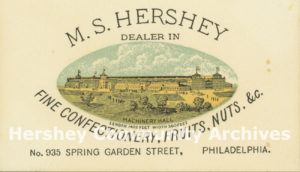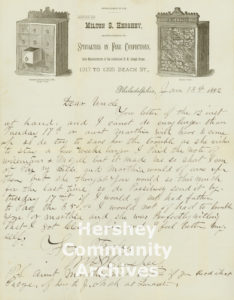HersheyArchives@30, Part 1: Where Would We Be without Family?
This is part of a series celebrating the 30th anniversary of Hershey Community Archives by highlighting 30 items from the collection.
While Hershey’s Milk Chocolate is an iconic symbol of the United States, its creator, Milton Hershey, is less well-known. And even if you know that Milton Hershey built a town and funded a school for disadvantaged children with the profits from that chocolate bar, you may not know that Milton Hershey came by his success the hard way: he tried and failed and tried again until he achieved success.
It is very easy to overlook or dismiss the years of struggle when someone like Milton Hershey ultimately achieves such tremendous success. Fortunately, the Archives holds evidence of his struggles and his early failures. These artifacts help us to better understand Milton Hershey and the events that shaped him.
Milton Hershey opened his first confectionery shop in Philadelphia, Pennsylvania in 1876. He was 18 years old. The business got off to a good start, sales buoyed by the crowds who flocked to Philadelphia to visit the Centennial Exposition.
Business grew and a few years later, needing more space, Milton Hershey moved his shop down the street to larger quarters at 925 & 927 Spring Garden Street and operated a wholesale business from 532 Linden Street (just around the corner). But by 1880 the business was beginning to falter.
The Archives holds several letters from Milton Hershey to his Uncle Abraham Snavely that were written between December 1880 and January 1882. Each letter is much the same, pleas for loans of money or requests for patience because Milton Hershey had not repaid the previous loans. The Archives does not hold any letters from Uncle Abraham. We can imagine that as Milton Hershey continued to beg for more and more financial support, Abraham became exasperated and disillusioned with his nephew. Milton’s last letters to his Uncle indicate that Abraham Snavely was dragging his feet (and wallet) about sending any more money.
The last letter in the Archives’ collection suggests just how desperate Milton Hershey had become.
[Transcript]
ESTABLISHED IN 1876
Office of
MILTON S. HERSHEY
MANUFACTURE OF
SPECIALTIES IN FINE CONFECTIONS
Sole Manufacturer of the Celebrated H.H. Cough Drops
1217 TO 1225 BEACH ST.,
Philadelphia, Jan 13, 1882
Dear Uncle
You letter of the 12 inst
at hand , and I canot do anny longer than
Tuesday 17th or aunt Martha will have to come
up so do try to save her the trouble as she wishes
to stay a few weeks longer I Paid the note of
wisemans & Mcgill but it made me so short I can
[n]ot Pay my Bills. And Martha would of come up
then but she thought You would do this much for the
last time. So do Possitively send it by
Tuesday 17inst if I would of [if I] not had father
to Pay the 350.00 I would not of had to trouble
You or Martha and she was Perfectly willing
that I got Clear of him and I feel better myself,
Your Truly,
MSHershey
Aunt Martha wish to [k]now if you Recd that
Pacye of h?? Tr J.Ohoh at Lancaster
The letter’s reference to having to pay his father reveals another layer to Milton Hershey’s financial struggles. Henry Hershey had arrived to “help” his son in late 1880. Full of ideas and vision, Henry designed a candy display cabinet (pictured on Milton Hershey’s stationery letterhead) that Henry was certain would benefit his son’s business.
Milton’s mother and his Aunt Mattie were not pleased with Henry Hershey’s involvement with the business. The women viewed him as a distraction and a disruption. They urged Milton to pay his father for the candy cabinet so that his father would leave Philadelphia. Yet Milton didn’t have enough money to invest in another venture. While he agreed to pay his father, that payment was the final blow to Milton Hershey’s first candy business.
After struggling for six years to make his first business a success, Milton Hershey closed his shop in the spring of 1882. While the end of this business was not a happy conclusion, Milton Hershey learned many lessons about supply and demand, credit, cash flow and the importance of limiting your product line. These were all lessons that he would put to use more profitably in future business ventures.
#HersheyArchives@30

